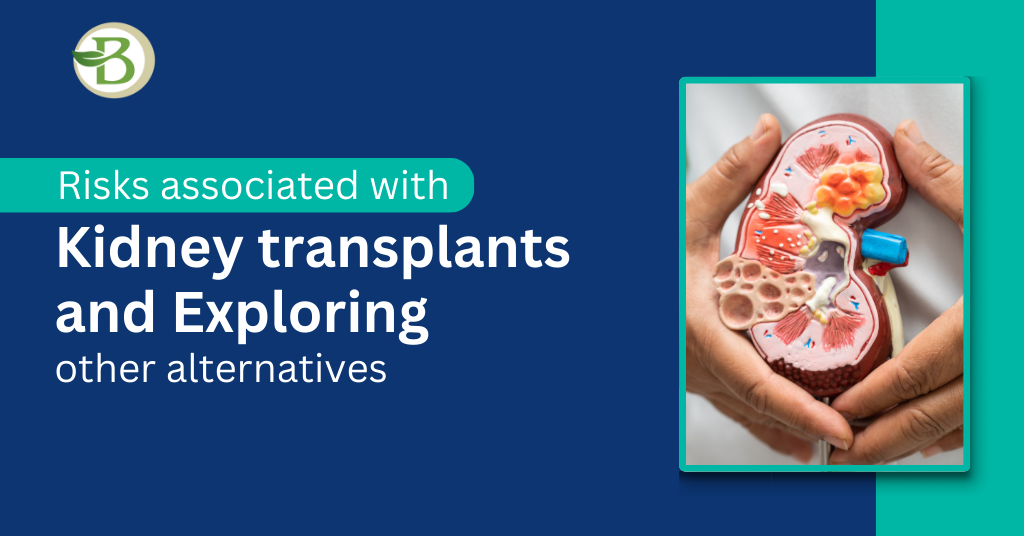Outcomes and Surgical Complications in Kidney Transplant
Are you exploring alternatives to a Kidney transplant to save yourself from risks associated with the operational process? Are you not fit enough for an organ transplant and conflicted about which chronic kidney disease treatment is right for you? Well, Bharat Homeopathy is the solution for you. Bharat Homeopathy offers a complete cure for various kidney diseases with the support of renowned doctors.
A kidney transplant surgery is a major operation that has many complications associated with it. Right from the surgery, the risks for infections, blood loss, etc. began, and health issues like Hernia, rejection of transplanted kidney, and damage to blood vessels and urine tubes have chances of developing till lifetime after the operation.
However, modern medicines may offer only organ transplants as a solution for Chronic kidney diseases; Homeopathy offers a more acceptable treatment alternative. The science offers a Kidney disease treatment with no side effects following a non-invasive procedure. To opt for any surgical solution for your health problems, the first step is to collect information about complications and look for any alternatives available. We provide here all the relevant data you need to know about the risks of kidney transplants and alternatives.
Immediate risks of a kidney transplant
The initial days and weeks after a kidney transplant are of great importance. The patient is still kept in the hospital for observation purposes to examine the efficiency of the surgery. With time, they may be allowed to stay home after being prescribed a set of medicines and allotting a regular check-up schedule.
However, some patients may experience certain kidney transplant risk either during or within a few initial days of the transplant. Here, we mention the most common early risks;
- Delayed graft function: Around 20-60 % of patients who received kidney transplants from deceased donors experience delayed graft function, the medical name for the condition when the kidney doesn’t start performing its function immediately after the transplant. For the time being, the patient is kept on dialysis until the transplanted kidney copes with the overall body and starts functioning.
- Blood loss: This complication is experienced by 10-20 % of the patients. Due to the surgery, some people may face significant blood loss and may require an external supply from a donor of the same blood group. Some people may need a blood transfusion and others may need to return to the operating theatre to stop the bleeding.
- Infection: During the Kidney transplant, around 10-20 % of patients experience certain kinds of infections. These infections are usually related to urine, chest or surgical wounds. The reason behind these infections is that the immune system may recognise the transplanted kidney as an unwanted foreign substance.
It has also been observed that patients with diabetes may experience a sudden rise in their insulin levels after the transplant. However, everyone is unique and risks may differ from patient to patient. One may not ignore any sign or signal given by the body that seems unusual and seek a medical professional. So, these were immediate risks that a person may face directly after the transplant. Now, we will be discussing the long-term risks associated to it.
Longer-term risks of a kidney transplant
There are some long-term risks of a kidney transplant that may occur after months or years after the operation. The number of prescribed medicines and frequency of visits to the hospital significantly reduce with time. But, some patients can experience complications long after the transplant and must communicate with their doctors about it. Here, we mention the most common delayed risks;
- Rejection of Kidney Transplant:
Within the first year of the kidney transplant, around 10-15 % of patients face this. The chances of this type of rejection are high in the first six months after the transplant; that’s why the patients are prescribed certain anti-rejection medicines, but these medicines are not always as effective as needed. This subsequently leads to rejection of the transplanted Kidney by the immune system and body.
- Hernia:
A hernia after a kidney transplant happens in about 5-10% of cases. It’s when a part of your body pushes through a weak spot present in the muscle or tissue that holds it in place. This usually involves an organ from your belly pushing through a wall of your belly. Factors that increase the chance of getting a hernia after a kidney transplant include being overweight, over 50 years old, female, and having had multiple surgeries.
- Narrowing of Blood vessels or urine tubes:
Around 1-5% of patients may experience either narrowing of blood vessels or the urine tube. If your blood pressure is hard to manage with medication or your kidney function declines without a clear reason, it might be due to a narrowed kidney transplant artery.
A similar issue occurs if your kidney transplant’s function decreases and scans reveal urine buildup in the kidney (hydronephrosis), indicating a blockage in the ureter. This blockage is most common at the point where the ureter meets the bladder, but it can occur anywhere along the tube.
Homeopathy – An Alternative to Kidney Transplant
When organ donation isn’t a valid option, homeopathy steps in to help manage symptoms, minimise complications, and improve emotional health, enhancing the lives of those with chronic organ failure such as renal failure.
In the process of organ transplant, the major difficulty lies in finding a suitable donor, and the transplant procedure itself is very complex, leaving many without any other treatment choices.
In these situations, homeopathy is used to manage overall health and improve life quality. For chronic conditions such as Kidney failure, controlling symptoms is the key. Homeopathy plays an important role in symptom management and even slowing down the disease.
Homeopathy can significantly provide various kinds of Kidney disease treatment, including stones, blood in urine, pain, and Chronic kidney failure. It can also delay or prevent the need for dialysis or transplant.
Patients on dialysis or transplant waiting lists can benefit greatly from Homeopathy kidney treatment, improving their quality of life. Homeopathy is suitable for all kidney disease patients, as it addresses the root causes of their issues. Additionally, the health of the kidneys impacts the heart, emphasising the importance of maintaining overall health.
Thus, Homeopathy can turn out to be an alternative to Kidney transplants, which will give permanent relief to patients without any side effects.
Bharat Homeopathy – India’s premier Homeopathic centre for Kidney Diseases
In matters of health care, any decision should be taken after careful consideration. It is also an important decision as to which homeopathic centre you should take treatment from, for your kidney problems. At Bharat Homeopathy, our results reflect our success and authenticity.
We take all necessary measures to provide our patients with effective and reliable Treatment for kidney failure. Our team of kidney specialists, including Dr. Mahima, ensures that each and every person who puts their trust in us receives a patient-centric, completely individualised cure. With years of experience, doctors at Bharat Homeopathy have built a strong reputation in the medical sector.
Call our Kidney specialist doctors today to book an appointment and begin your journey to healing your kidneys.


